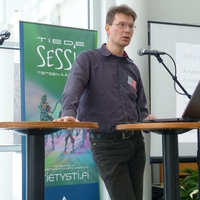Papers by Sławomir Mandra
Electronics and Electrical Engineering, 2014
Servo-drives have a significant influence on the tracking accuracy of numerically controlled mach... more Servo-drives have a significant influence on the tracking accuracy of numerically controlled machine tools. It is important to properly choose the structure and gains of a servodrive control system. This paper presents a tuning method for position and velocity controllers of digital servo-drives. The proposed method allows the controllers' gain values regardless of controller types (P, PI, PD or PID) to be determined. It takes into account a number of parameters relevant to practical applications, such as the shape of the position error signal and the resolution of the transducer used to measure the angular position of the motor shaft. The controller gains are determined for a parabolic position command signal. A comparison of the influence of both controllers' types and feed-forward control types on tracking error is also presented.

SPIE Proceedings, Mar 6, 2006
Resolver measurement position systems indicate an absolute position of rotating machine component... more Resolver measurement position systems indicate an absolute position of rotating machine components like motor shafts or robotic arms. The system consists of the three parts: resolver, hardware interface and decoder. Decoder decodes resolver signals and determines the absolute position. The hardware interface and decoder is called Resolver-to-Digital Converter (RDC). Nowadays, resolver measurement systems in most cases use the silicon ASIC chips or DSP processors able to perform some specific trigonometric and filtering functions required in the demodulation process. This paper presents the results of the experiments of the RDC as well as the theory of operation of the resolver, hardware interface and decoder based on the TMS320F28 12 digital signal processor. As a reference during experiments popular resolver-to-digital conversion ASIC system from Analog Devices AD2S90 and incremental encoder were used. The percentage usage of the processor capacity by the resolver software is reported and several considerations of the possibility to use the processor to perform other tasks in parallel take place.
IEEE Transactions on Control Systems and Technology, 2023
Przegląd Elektrotechniczny, 2011
This paper addresses the design of iterative learning control laws (ILC) for both trial-to-trial ... more This paper addresses the design of iterative learning control laws (ILC) for both trial-to-trial error convergence and along-the-trial performance. It is shown how these control laws can be designed using the theory of discrete linear repetitive processes in combination with a guaranteed cost control approach. The parameterization of the controllers is performed by the solution of linear matrix inequalities (LMIs). The paper is concluded with experimental results for the position control of a Permanent Magnet Synchronous Motor (PMSM).

IEEE Transactions on Control Systems and Technology, May 1, 2021
This article develops an iterative learning control (ILC) design for a class of multiple-input–mu... more This article develops an iterative learning control (ILC) design for a class of multiple-input–multiple-output systems where a distributed heating system is used as a particular example to experimentally validate the design. The class of systems considered is described by a parabolic partial differential equation, which, for control design, is approximated by a finite-dimensional state-space model obtained by applying the method of integro-differential relations combined with a projection approach. In some cases, including the distributed heating system, this approximation may result in a nonminimum phase system and, hence, pose an additional design challenge. In this work, the ILC law is computed in the frequency domain by solving a convex optimization problem, and its performance is evaluated in both simulation and experiment.
Napędy i Sterowanie, 2009

This paper presents a robust design approach to iterative learning control using a PID controller... more This paper presents a robust design approach to iterative learning control using a PID controller that exploits frequency domain specifications for both robustness and performance. In a first constrained optimization stage, optimal parameters for the PID controller are determined aiming at a highest-possible integral gain for a fast compensation of step-like disturbance signals – directly in the trial in which they appear. The second design stage involves the optimal parametrization of both filters used in the ILC law, i.e., the learning filter in the form of a finite impulse response filter and the Q-filter, chosen as an infinite impulse response filter. Its goal is to meet performance specifications in a wide-enough frequency range. The overall design is performed efficiently by convex optimization techniques. Simulation results show that both robust and accurate tracking behavior is achieved after a few iterations only.
Control Engineering Practice, Aug 1, 2017
This contribution presents a robust ILC control design based on guaranteed costs. By combining th... more This contribution presents a robust ILC control design based on guaranteed costs. By combining this ILC design with dynamic feedforward control and an observer-based disturbance compensation, the initial tracking errors in an early learning stage can be reduced. The benefits of the proposed design approach are pointed out at the example of a robust position control of a Permanent Magnet Synchronous Motor (PMSM), which is subject to uncertain model parameters. The paper is concluded with convincing experimental results from a dedicated test rig. Moreover, a comparison with a classical observer-based tracking control is provided.
2018 Annual American Control Conference (ACC), 2018
This paper considers iterative learning control design for non-minimum phase dynamics using a mod... more This paper considers iterative learning control design for non-minimum phase dynamics using a model derived from an experimental spatially distributed system, i.e., a heating system. A novel design based on an H∞ setting and convex optimization with validation in both simulation and experiment.
In the paper the procedures and practical methods of tracking errors compensation in servo-drives... more In the paper the procedures and practical methods of tracking errors compensation in servo-drives are considered. The PID controllers of servo-drives do not decrease tracking errors enough in the case of fast changes of the motion velocity. The good method of decreasing of the tracking errors in cascade servo-drives is to use the feedforward command and feedforward friction compensation. The exemplary results of the test of CNC system based on servo-drives with PMSM motors with proposed control method including the on-line calculation of feedforward loops parameters are presented.
Przegląd Elektrotechniczny, 2011
IEEE Transactions on Control Systems Technology, 2021
This article develops an iterative learning control (ILC) design for a class of multiple-input–mu... more This article develops an iterative learning control (ILC) design for a class of multiple-input–multiple-output systems where a distributed heating system is used as a particular example to experimentally validate the design. The class of systems considered is described by a parabolic partial differential equation, which, for control design, is approximated by a finite-dimensional state-space model obtained by applying the method of integro-differential relations combined with a projection approach. In some cases, including the distributed heating system, this approximation may result in a nonminimum phase system and, hence, pose an additional design challenge. In this work, the ILC law is computed in the frequency domain by solving a convex optimization problem, and its performance is evaluated in both simulation and experiment.
IEEE Transactions on Control Systems Technology, 2018
This paper develops an innovative robust iterative learning control law using the repetitive proc... more This paper develops an innovative robust iterative learning control law using the repetitive process setting. The new design is experimentally validated through a comprehensive set of experiments highlighting the capabilities for position tracking control of a permanent magnet synchronous motor subject to load disturbances in the presence of uncertainties in selected parameters.
Control Engineering Practice, 2017
This contribution presents a robust ILC control design based on guaranteed costs. By combining th... more This contribution presents a robust ILC control design based on guaranteed costs. By combining this ILC design with dynamic feedforward control and an observer-based disturbance compensation, the initial tracking errors in an early learning stage can be reduced. The benefits of the proposed design approach are pointed out at the example of a robust position control of a Permanent Magnet Synchronous Motor (PMSM), which is subject to uncertain model parameters. The paper is concluded with convincing experimental results from a dedicated test rig. Moreover, a comparison with a classical observer-based tracking control is provided.
2015 IEEE 9th International Workshop on Multidimensional (nD) Systems (nDS), 2015
This paper addresses the design of iterative learning control laws (ILC) for both trial-to-trial ... more This paper addresses the design of iterative learning control laws (ILC) for both trial-to-trial error convergence and along-the-trial performance. It is shown how these control laws can be designed using the theory of discrete linear repetitive processes in combination with a guaranteed cost control approach. The parameterization of the controllers is performed by the solution of linear matrix inequalities (LMIs). The paper is concluded with experimental results for the position control of a Permanent Magnet Synchronous Motor (PMSM).
2008 13th International Power Electronics and Motion Control Conference, 2008
... Lech M. Grzesiak x xx ,Tomasz Tarczewski x , Sławomir Mandra x ... SERVO-DRIVE MODEL To creat... more ... Lech M. Grzesiak x xx ,Tomasz Tarczewski x , Sławomir Mandra x ... SERVO-DRIVE MODEL To create a mathematical model of PMSM following assumptions are made [1]: saturation is neglected, the back emf is sinusoidal and eddy current and hystere-sis losses are negligible. ...

Resolver measurement position systems indicate an absolute position of rotating machine component... more Resolver measurement position systems indicate an absolute position of rotating machine components like motor shafts or robotic arms. The system consists of the three parts: resolver, hardware interface and decoder. Decoder decodes resolver signals and determines the absolute position. The hardware interface and decoder is called Resolver-to-Digital Converter (RDC). Nowadays, resolver measurement systems in most cases use the silicon ASIC chips or DSP processors able to perform some specific trigonometric and filtering functions required in the demodulation process. This paper presents the results of the experiments of the RDC as well as the theory of operation of the resolver, hardware interface and decoder based on the TMS320F28 12 digital signal processor. As a reference during experiments popular resolver-to-digital conversion ASIC system from Analog Devices AD2S90 and incremental encoder were used. The percentage usage of the processor capacity by the resolver software is reported and several considerations of the possibility to use the processor to perform other tasks in parallel take place.










Uploads
Papers by Sławomir Mandra